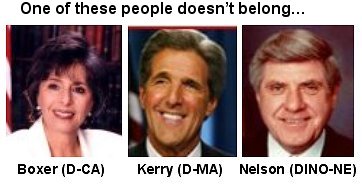When Is A Democrat Not A Democrat?
While it's gratifying when it happens, I don't think we expect every Senator to vote precisely the way we would like on every issue. As the Republicans took great joy in pointing out in the last presidential election, John Kerry has one of the most liberal records in the Senate and yet even he has disappointed us on occasion.
But in looking at the most important Senate votes in 2005, Democrats like Ben Nelson of Nebraska and Mark Pryor of Arkansas vote so often with the conservative side of the aisle that one wonders how much good they do by continuing the charade of being Democrats – and, yes, I have concrete examples.
Here's a comprehensive list of the times Nelson has voted with Republicans this year on major issues:
- Yea vote in confirmation of Alberto R. Gonzales for Attorney General.
- Yea vote for the Bankruptcy Abuse Prevention and Consumer Protection Act of 2005.
- Nay vote on bill to repeal the tax subsidy for certain domestic companies which move manufacturing operations and American jobs offshore.
- Yea vote in confirmation of Janice Rogers Brown to be U.S. Circuit Judge.
- Yea vote in confirmation of William H. Pryor, Jr. to be U.S. Circuit Judge.
- Voted for cloture (to end debate) on John Bolton and deny Democrats information they requested.
- Yea vote in confirmation of Thomas C. Dorr to be Under Secretary of Agriculture for Rural Development, despite a record of improperly obtaining farm subsidies.
- Yea vote for the Dominican Republic-Central America-United States Free Trade Agreement (CAFTA).
- Yea vote to table Levin Amendment to clarify the prohibition on certain civil liability actions in the Protection of Lawful Commerce in Arms Act (reduction in gun-maker liability).
- Nay vote in amendment to exempt lawsuits involving injuries to children from the definition of qualified civil liability action in the Protection of Lawful Commerce in Arms Act (reduction in gun-maker liability).
- Nay vote in amendment to expand the definition of armor piercing ammunition and for other purposes in the Protection of Lawful Commerce in Arms Act (reduction in gun-maker liability).
- Yea vote for the Protection of Lawful Commerce in Arms Act, a bill to prohibit civil liability actions from being brought or continued against manufacturers, distributors, dealers, or importers of firearms or ammunition for damages, injunctive or other relief resulting from the misuse of their products by others.
- Yea vote for Bush's Energy Policy Act of 2005.
- Nay vote on a rule that would stopped the Administrator of the Environmental Protection Agency from exempting coal and oil-direct utility units from the source category list under the Clean Air Act. The Leahy-Collins resolution would have rejected the EPA's categorical exemption of power plants from the highly protective emission standards mandated by the Act's hazardous air pollution control program.
- Nay vote on bill to provide funding for interoperable communications equipment grants for first responders.
- Nay vote on general relief bill for Hurricane Katrina victims, that included a critical exemption from new bankruptcy laws to take effect in October.
- Voted to confirm John Roberts as Chief Justice of Supreme Court.
- Voted against money to provide for the Low-Income Home Energy Assistance Program for the 2005-2006 winter.

Although Nelson is by far the worst offender, Senator Mark Pryor hasn't done much better in carrying the liberal torch, voting much the same way as Nelson on a wide range of important issues.
Which naturally begs the question: When is a Democrat not a Democrat?
I certainly understand that, to a far greater extent than in the House of Representatives, sheer numbers mean a lot in the Senate and every seat Democrats hold leads us closer to the coveted majority, committee chairmanships and running the joint again.
But it raises an interesting question when, in the trenches, on a day-to-day basis, we have Democratic Senators who are so likely to vote with the other side on causes of such great importance. Being from Nebraska, I understand that Ben Nelson is about as liberal a Democrat as we're going to see come from the Cornhusker State. But are we better off in the long run if we find a candidate who, if elected, will truly help us do a 180-degree turn on the American agenda, versus helping the Far Right steer us more toward the rocks?
We need to seriously consider this when evaluating Nelson in Nebraska next year – his term is expiring -- and consider the extent to which we may want to start beating the bushes in the Great Plains for someone who looks at least more like Jim Jeffords and less like Orrin Hatch. The same goes for Pryor, Landrieu in Louisiana, Lieberman in Connecticut and Salazar in Colorado when it's time for them to run again.
While it may be a painful process and we may even sustain some temporary losses, getting rid of the bad apples may go a long way toward the long-term health of our orchard and our vision of what America should look like.

















<< Home